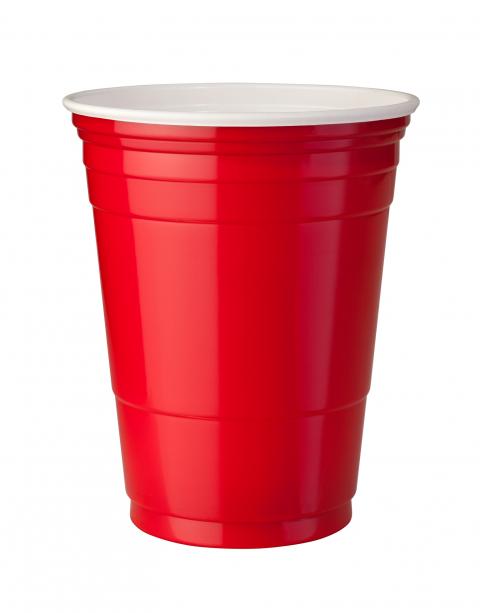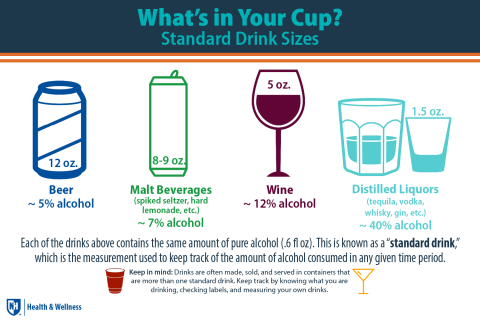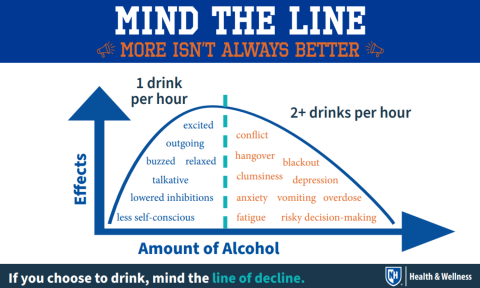Health & Wellness provides services, education, and support to help you make informed and value-driven choices around alcohol.
Learn About Alcohol

Pop culture often portrays alcohol and partying as an expected and unavoidable part of college life. However, the reality is far more complex. At UNH, some students don’t drink at all, many others drink in low risk ways, and some drink in ways that are a risk to themselves and others. When it comes to alcohol, it’s important to know:
- Choosing not to drink is always a legitimate choice
- How to advocate for your choice not to drink
- Ways to recognize and make low risk drinking choices
- How to help a friend in an emergency
- How to avoid negative consequences due to high risk drinking (e.g. arrests, regrettable decisions, getting sick)
We encourage you to make your own choices at UNH that will help you accomplish your academic and personal goals. Find friends who support your choices and get involved with student groups that share your values and interests. The choice not to consume substances is a valid, low-risk choice. If you choose to drink, please do so in a way that doesn’t negatively impact the safety, success, and well-being of yourself or others.
Not Everybody Drinks
Whatever your reason(s) not to drink, choose what’s right for you. And when others notice that you’re having a good time without the negative consequences that can come with drinking, it’s likely that you’ll empower others to make their own choices as well.
Who says you need alcohol to have fun? Below are some ideas of ways to get involved, meet new people and have a good time without alcohol.
- Join a student organization
- Take a class at UNH Campus Recreation
- Attend events at the MUB hosted by student organizations and UNH. For more events, visit Wildcat Link for events
- Ask your RA to organize a themed party or hall event
- Attend a UNH Athletics game
- Make dinner with friends
- Watch your favorite tv shows or movies
- Enjoy your free time and do something for yourself
- Go for a walk in College Woods
Some of the top reasons students choose not to drink include:
- It’s illegal if you are under 21
- Avoiding getting into trouble for underage drinking
- The desire to stay safe and in control
- Religious or moral reasons
- Previous negative experiences with alcohol
- Health-related reasons
- Family history of substance use disorders
- Personal recovery from alcohol or other drug use
Tips to Refuse a Drink
- "Thanks, but no thanks." You can be polite, but you still aren’t interested. It just isn’t something you’re into.
- Say "no," plainly and firmly. In some situations, just saying no without a lot of arguing and explaining is the best response. Just make sure your “no” is a strong and determined one.
- Make a joke. Sometimes humor is the best way to respond to a situation, as it can lighten a serious mood. It can also divert attention away from you and onto something else.
- Give a reason why it’s a bad idea. Maybe you don’t want to drink because you know someone who is struggling with alcoholism and you can see how drinking has impacted their life. Backing up your refusal with evidence gives it more power.
- Make an excuse why you can’t. Maybe you have something else to do that will interfere. Or you have to be somewhere at a specific time. Say it and stick to it.
- Suggest an alternative activity. Lots of students wind up doing stuff they don't want to do because they lack other options and they’re bored. By thinking of something better to do, you’re offering everyone an “out.” You just might be surprised who might take you up on it.
- Ignore the suggestion. Pretend you didn’t hear it, and change the topic to something else. Act like you don’t think the idea was even worth discussing.
- Repeat yourself if necessary. Sometimes it takes more than once, on more than one occasion. Just because someone asks more than once, that doesn’t mean you have to cave.
- Leave the situation. If you don’t like where things are headed, you can take off. It might seem risky, but with you leading the way, others who really don’t want to do it either just may follow you.
- Strength in numbers. Make a pact with your friends to stick with your decision. Often, knowing that your friends will back you up can help you feel more comfortable being assertive. Sometimes “we” feels stronger than “I”.
Count Your Drinks Accurately
Pay attention to serving sizes. For mixed drinks, use a shot glass to measure alcohol whenever possible. Without measurements, mixed drinks can have more than 1 standard serving of alcohol, which may lead to greater intoxication. Avoid drinking punches or drinking out of a liquor bottle. Shots of alcohol are absorbed rapidly into the body. This may lead to dangerous levels of intoxication and impaired judgment very quickly.
Use this Blood Alcohol Content (BAC) Calculator to estimate how much alcohol is in your bloodstream after a certain amount of alcohol.
Standard Drinks
Some people think they can have more beer than other kinds of alcohol because they think it has less alcohol. That’s not necessarily true. It’s the total amount of alcohol in a serving that counts. Knowing what a standard drink is, and our limit of standard drinks, allows us to stay within recommended health guidelines. Standard drinks consist of the following:
- 12 ounces of regular beer, which is usually about 5% alcohol
- Keep in mind that craft beers now often come in 16 oz. cans with higher alcohol percentages
- 5 ounces of wine, which is typically about 12% alcohol
- 1.5 ounces of distilled spirits, which is about 40% alcohol

Standard Drink Sizes (PDF Download)
The Line of Decline
More isn't always better. If you choose to drink, sticking to one standard drink per hour can help you avoid the negative consequences many students identify they experience when drinking.

Rethinking Drinking Calculators
(e.g., drink size calculator, alcohol spending calculator)
According to the National Institute on Alcohol Abuse and Alcoholism, "for women, low-risk drinking is defined as no more than 3 drinks on any single day and no more than 7 drinks per week. For men, it is defined as no more than 4 drinks on any single day and no more than 14 drinks per week." For more information on moderate versus binge drinking, visit the NIAAA website.
If you choose to consume alcohol, following low risk drinking strategies can prevent much of the harm associated with alcohol use. Some low risk drinking strategies include:
- Knowing standard drink sizes
- Measuring out standard drinks
- Setting a drink limit and sticking to it
- Eating before and during drinking
- Spacing out drinks to one per hour
- Having a plan and sticking to it (Where am I going? Who am I going with? How am I getting home?)
- Alternating alcohol with non-alcoholic beverages such as water or soda
- Hanging out with friends who don’t drink as often or as much
- Pouring your own drinks so you know exactly how much alcohol they contain
- Avoiding leaving drinks unattended
- Avoiding “pre-gaming," drinking games, or taking shots so that you don’t drink too quickly
- Avoiding mixing alcohol with energy drinks, drugs, non-prescription medications, prescriptions, or illicit drugs
- Considering your mood – when we are excited or upset we may not consider the speed at which we are drinking
Alcohol overdose, also referred to as alcohol poisoning, is a serious and potentially life-threatening incident that occurs when someone drinks too much.
Call for help if you see these signs:
- Someone has vomited (may happen while passed out or sleeping)
- Slurred speech or difficulty speaking
- Pale or blue appearance
- Cold or clammy skin
- Unconscious or unresponsive
- Shallow or irregular breathing
Remember, you may not know when the person started/stopped drinking, what they have been drinking, how fast they drank, if they are under the influence of other drugs (prescription, non-prescription medications or illegal drugs), or if they have any health conditions that might change how alcohol impacts their body and behavior.
How to help while you wait for 911:
- Do not leave the person alone. Wait with them until help arrives.
- Monitor their breathing
- If they are vomiting, help prevent choking by keeping them upright or, if they are lying down, turn their body to one side with knees bent and ensure their head is also turned to the side
- Do not move them unless they are in immediate danger
- Do not try to sober them up with cold showers, food, or drinks
- Talk in a calm manner. Don’t laugh, ridicule, argue with or provoke the person
Medical Amnesty
When a student acts on behalf of another student and calls for help to emergency personnel or a UNH staff member for a condition stemming from the use of alcohol, both the student(s) offering assistance and the student in need of medical attention have the option of filing for medical amnesty. For more information.
Source: Adapted from RAINN (Rape, Abuse & Incest National Network) article Drug-Facilitated Sexual Assault
What is drug-facilitated sexual assault?
Drug-facilitated sexual assault occurs when alcohol or drugs are used to compromise an individual's ability to consent to sexual activity. These substances make it easier for a perpetrator to commit sexual assault because they lower inhibitions, reduce a person’s ability to resist, and can prevent them from remembering details of the assault. Drugs and alcohol can cause diminished capacity, a legal term that varies in definition from state to state.
You may have heard the term “date rape drugs” to refer to substances that perpetrators use to commit sexual assault, such as “roofies.” Alcohol is the most common substance used to perpetrate drug-facilitated sexual assault. Drug-facilitated sexual assault can happen to anyone, by anyone, whether the perpetrator is an intimate partner, stranger, or someone you’ve known for a while.
How it happens
There are two main ways that drug-facilitated sexual assault occurs: 1) when the perpetrator takes advantage of a someone’s voluntary use of drugs or alcohol and, 2) when the perpetrator intentionally forces a victim to consume drugs or alcohol with or without their knowledge.
The type of drug-facilitated sexual assault you might think about first is the kind in which a perpetrator slips a drug into someone’s drink. Though many survivors have experienced this, for many young people, especially on college campuses, drug-facilitated sexual assault can take a variety of forms.
Drug-facilitated sexual assault can look like:
- Coercing or pressuring someone beyond their comfort zone to ingest more drugs or alcohol or different substances than they are comfortable with.
- Ignoring or refusing to help someone who says they’ve had too much to drink or is having a negative drug experience and needs help.
- Initiating sexual contact with someone because they are intoxicated, and less likely to resist.
- Refusing to tell someone what is in their drink or the type of dosage of drug they are ingesting.
A perpetrator may intentionally drug someone, resulting in a situation in which it is easier to manipulate the circumstances and commit an assault. Perpetrators use a variety of substances to incapacitate a victim.
Commonly used substances:
- Alcohol is the most commonly used substance in drug-facilitated sexual assault.
- Prescription drugs like sleep aids, anxiety medication, muscle relaxers, and tranquilizers may also be used by perpetrators.
- Street drugs, like GHB, rohypnol (“roofies”), ecstasy, and ketamine can be added to drinks without changing the color, flavor, or odor of the beverage.
It is not your fault.
Many survivors have strong feelings of self-blame after drug-facilitated sexual assault. They may feel that their choice to drink or to use drugs put them in a dangerous situation that led to the assault. It’s important to remember that if a sexual assault occurs under these circumstances, it is still not your fault. When you choose to use drugs or alcohol, you are not choosing to be sexually assaulted. The blame for this crime falls ONLY on the perpetrator.
Where do I go for help?
UNH SHARPP is a free and confidential resource for UNH faculty, staff, and students who have been impacted by interpersonal violence (sexual assault, relationship abuse, stalking, and sexual harassment), regardless of whether that experienced happened during their time at UNH or not.
Getting Help
- 24/7 support is a phone call away
- UNH SHARPP Helpline: (603) 862-7233
- The National Sexual Assault Hotline: (800) 656-4673
- Online chat: online.rainn.org
- Español: rainn.org/es
- For more information go to RAINN (Rape, Abuse & Incest National Network) the nation's largest anti-sexual violence organization.
New Hampshire State Law
If you are under 21, it is illegal to:
- Have alcohol in your personal possession (externally or internally)
- Misrepresent your age for the purpose of obtaining alcohol
- Drive or ride in a car with alcoholic beverages except when accompanied by a parent, guardian, spouse or someone 21 years of age, or older
- Be intoxicated by consumption of an alcoholic beverage
It is illegal for anyone to:
- Manufacture, sell, possess, or use a falsified ID
- Purchase alcohol for a minor or someone who is intoxicated
- Sell or give away alcohol to a minor or individual who is intoxicated
- Drive while under the influence of alcohol
For more information, please visit the New Hampshire State Statues for Alcoholic Beverages: NH State Statues for Alcoholic Beverages
UNH Rules and Regulations
UNH is committed to establishing and maintaining an environment that supports health, safety, and academic success. The unlawful possession, use, and distribution of illicit drugs and alcohol on the University campus or during University-sponsored activities are prohibited. Students found to be in violation may be subject to:
- Arrest and conviction under the applicable criminal laws of local municipalities, the State of NH or the United States. A conviction can result in sanctions including probation, fines, and imprisonment.
- Discipline in accordance with the procedures of the Student Conduct System. Discipline may include disciplinary probation, loss of scholarship, loss of study abroad opportunity, termination of housing or dismissal from the University.
For more information, please visit the UNH Students Rights, Rules and Responsibilities: UNH Student Code of Conduct
Services Available
There are many resources available to you at UNH if you are contemplating your alcohol use, interested in reducing your use, or seeking support for recovery.
We offer individual sessions with Educator/Counselors, Nancy Bushinsky, MSW, LICSW and Tess Kucera, MPH, CHES.
Meet one-on-one with an ANOD Educator/Counselor to:
- Learn more about how substance use affects your well-being
- Have a non-judgmental conversation about your use
- Learn strategies to support your wellness goals regarding substance use
- Learn how to talk to or support friends you may be concerned about
- Learn about community resources
- Learn more about substance use at UNH
Appointments
- All visits are confidential
- This service is available to all UNH students and is offered at no cost for full-time students who have paid their tuition/fees.
- Make an appointment online or by calling (603) 862-3823.
If you are concerned about your alcohol use, this anonymous online alcohol use screening takes only a few minutes and consists of a series of questions. After completing the screening, you will receive referrals, resources, and more information.
If you or a friend need help with alcohol, nicotine or other drug concerns, please visit our How to Help a Friend page and/or make an appointment to talk with a Wellness Educator/Counselor. Appointments are confidential.
For parents/family members of a student and looking for more information/resources related to alcohol at UNH:
We provide education and counseling to students who have been referred/mandated by Community Standards or legal court systems for alcohol and/or other drug violations.
Are you in recovery or considering it?
Want to host an alcohol program for students?
Peer Support Groups
Seeking support from peers is an important step in recovery. Below are several great local resources available to you.
The mission of SOS Recovery Community Organization is to reduce stigma and harm associated with addictive disorders by providing safe space and peer-based supports for people in all stages of recovery. Located in Dover, NH at 4 Broadway or Rochester, NH at 63 S. Main St , SOS offers peer support groups, telephone and text support services.
- SOS Recovery
- 1-603-841-2350
- Virtual Meetings: https://straffordrecovery.org/virtual-meetings/
- NH Alcoholics Anonymous (AA)
- NH-AA Hotline (800) 593-3333
“Narcotics Anonymous” does not refer to any particular drug or group of drugs. NA's program focuses on addiction, the obsessive-compulsive behavior, and recovery from it, not a specific drug. The only requirement for membership is the desire to stop using.
Al-Anon/Alateen provides support to individuals who are dealing with someone else's use of substances. This could be a family member, friend or loved one.
Online Resources and Tools
Further Reading
- Starving Themselves, Cocktail in Hand
- Closing in on Addiction: New Findings Suggest a Biochemical Common Ground
- Monitoring the Future
Organizations Working to Prevent Harms of Alcohol Use
- The National Advisory Council on Alcohol Abuse and Alcoholism
- Substance Abuse and Mental Health & Wellness Administration (SAMHSA)
- National Institute on Alcohol Abuse and Alcoholism (NIAAA)
New Hampshire Resources
Plant the Promise

On Friday, November 6th, 2020, Health & Wellness led its first 'Plant the Promise' event to commemorate Red Ribbon Week, the nation's oldest and largest drug prevention awareness program.
Alcohol, Nicotine and Other Drug Wellness Educators, members of the UNH Student Senate, and our Director of Health Education and Promotion planted red tulip bulbs in garden beds near the front corner of the Health & Wellness building.
The annual fall planting represents the work of raising awareness about the impacts of alcohol, nicotine and other drugs; actions taken with hope that in time, these efforts will produce positive change. The flowers, anticipated to become visible in the spring, represent the promise of beauty and well-being that grows from living drug free. How fitting that the tulips bloom during April, the month dedicated to National Alcohol Awareness!
These red tulips can also serve to remind us that living an alcohol, nicotine and drug -free life requires support from the community. Promoting an alcohol and drug -free campus culture benefits everyone. It assists individual community members in their personal path to wellness, and protects fellow members from harms associated with use, including exposures to second- and third-hand smoke or aerosol vapor and the negative outcomes of behaviors engaged in under the influence.
When Spring arrives and the tulips are in full bloom, take a moment to enjoy their beauty, reflect on the promise, and explore our website for more information.
